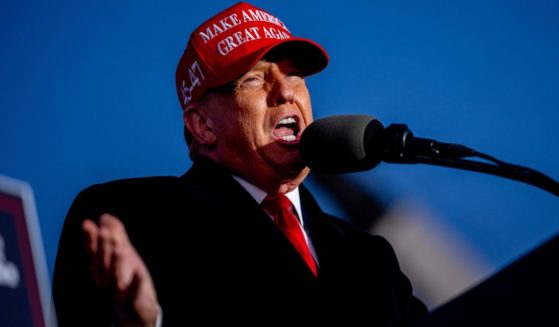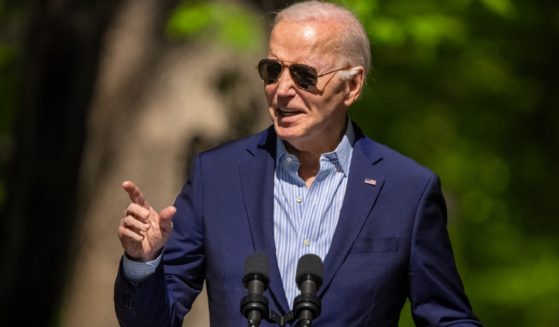Hopes rise for border funding deal - if Trump will go along
WASHINGTON (AP) — Capitol Hill talks to resolve an impasse over President Donald Trump’s demands for billions of dollars for his long-sought border wall are inching forward, with lawmakers focused first on forging agreement among themselves — and less on satisfying Trump’s shifting demands.
One such sign came Tuesday from Capitol Hill’s most powerful Republican, Senate Majority Leader Mitch McConnell, who says he’s not seeking Trump’s blessing in advance of striking a deal on border security funding, a move that appears to remove a significant potential hurdle confronting the talks.
McConnell told reporters that negotiators “ought to reach an agreement, and then we’ll hope that the president finds it worth signing.”
That’s a break from his stance during the recent 35-day partial federal shutdown, when McConnell, R-Ky., insisted for weeks that Trump’s buy-in would be needed before any agreement could be reached. Trump is seeking $5.7 billion for a U.S.-Mexico border wall, but it’s clear that the House-Senate negotiations won’t approve nearly that much. The Senate put a $1.6 billion plan on the table last year, though many House liberals think even that amount is too high. Government funding is set to expire on Feb. 16.
The developments came in the hours before Trump’s annual State of the Union address, in which the president was sure to again call for his long-stalled border wall.
At the same time, negotiators on the House-Senate panel sounded increasingly optimistic of reaching an agreement. The lead Senate GOP negotiator, Richard Shelby of Alabama, said he had a good conversation with House Speaker Nancy Pelosi and that staff is making progress in behind-the-scenes talks.
“Both sides have moved,” Sen. Roy Blunt, R-Mo., said. “And hopefully we’re going to continue to see movement.”
But if Tuesday’s developments increase the likelihood of an agreement among the pragmatic lawmakers dominating the talks — who are drawn from the deal-making appropriations committees — it could increase the risk that Trump might scuttle the entire effort if he’s not satisfied with the border-security package.
Meanwhile, negotiators are leaning on border-security experts to sort through their options. While Trump is insisting on physical structures like walls, fences and vehicular barriers, Democrats are focused more on next-generation scanners, additional manpower and help for detained migrants.
“We’re looking to see if there’s a way to get together in a comprehensive way — whether it’s a barrier, whether it’s a fence, whether it’s technology, whether it’s more personnel. I think it might be all of that,” Shelby told reporters.
A group of House GOP lawmakers returned Tuesday from a fact-finding trip to Texas, New Mexico and San Diego. Rep. Chuck Fleischmann, R-Tenn., said he came away from the trip with a better sense of what approaches work best in varied locations, but that fences or walls are a key piece of the border security puzzle.
“The wall deters people, and it buys the agents time,” Fleischmann said.
Texas Rep. Kay Granger, top Republican on the House Appropriations Committee, was also on the trip said it “absolutely” strengthened her conviction that physical barriers must be part of any agreement. She said the types of barriers that seem to work best — tall steel slats called “bollards” topped by concrete or steel — most resemble fences, not the walls Trump has demanded.
“That’s not my problem. I would call it a fence,” Granger told reporters.
She said she thinks a bipartisan agreement is “doable” and added, “I don’t want another shutdown.”
Hanging over the talks is a threat by Trump to label the situation on the southern border a national emergency and invoke powers to transfer money from other portions of the budget — like disaster aid intended for Army Corps of Engineers flood control projects — to his wall project.
Invoking these emergency powers is likely to spark a fierce backlash among lawmakers, including many Republicans. McConnell acknowledged Tuesday that he alerted Trump that both the Democratic-controlled House and the GOP Senate could move swiftly to block an emergency declaration, raising the chances that Trump would have to issue his first veto. McConnell opposes the idea of Trump building the wall by executive fiat but declined Tuesday to say whether he would vote for a resolution to try to overrule him.
There is plenty else at stake in the talks, which are likely to encompass all of the remaining seven unfinished spending bills for the current budget year. For starters, passing a catchall spending deal could pave the way to reverse the automatic cuts to federal spending that would kick in unless there’s a bipartisan deal for the upcoming fiscal year.
Democrats said McConnell’s declaration was a good indication for an agreement.
“Every time we leave it up to the conferees, Democrat and Republican, House and Senate, we’ve been able to come up with a good agreement. It’s when the president interferes that there’s a problem,” Senate Minority Leader Chuck Schumer, D-N.Y., said.
“So my advice to the president, if you don’t want to shut the government down, if you don’t want to have to declare a national emergency … stay out of it,” Schumer added. “Let the Senate and the House work their way and we can succeed.”
The Western Journal has not reviewed this Associated Press story prior to publication. Therefore, it may contain editorial bias or may in some other way not meet our normal editorial standards. It is provided to our readers as a service from The Western Journal.
Truth and Accuracy
We are committed to truth and accuracy in all of our journalism. Read our editorial standards.












